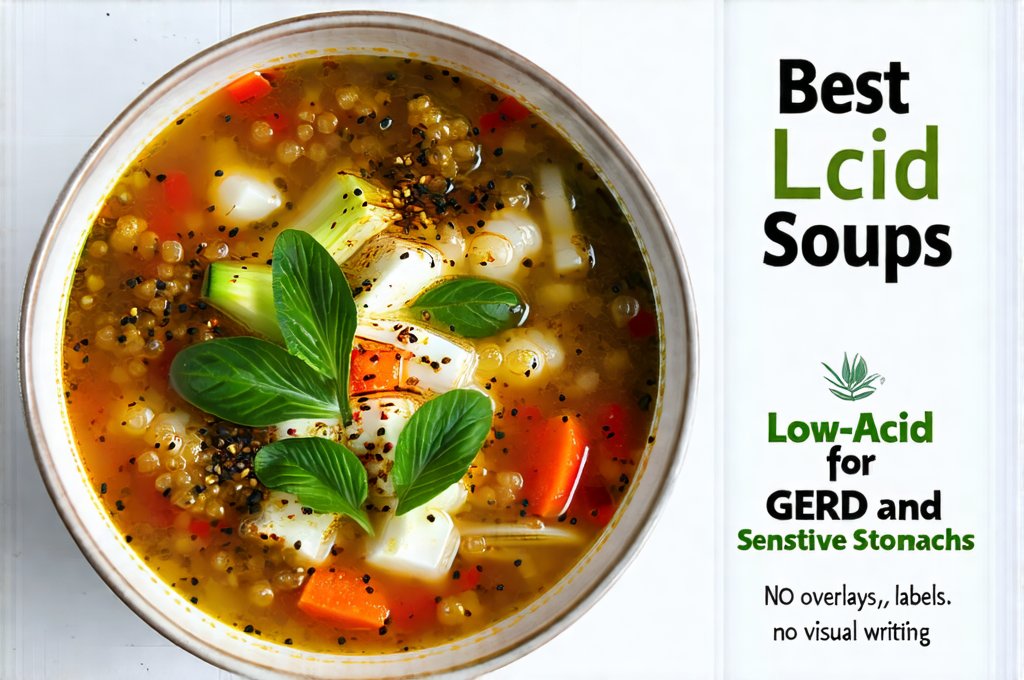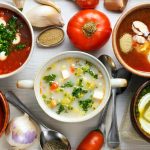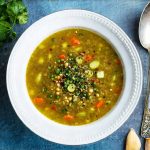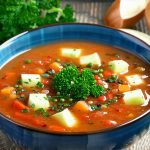Dealing with gastroesophageal reflux disease (GERD) or simply having a sensitive stomach can significantly impact dietary choices. Many individuals find themselves constantly searching for foods that won’t trigger unpleasant symptoms like heartburn, bloating, or indigestion. While eliminating common triggers like caffeine, alcohol, and spicy foods is often the first step, focusing on soothing and easily digestible options becomes crucial for long-term comfort. Soup, a traditionally comforting food, can be an excellent choice – but not all soups are created equal. This article will explore the best low-acid soup options designed to minimize discomfort for those with GERD or sensitive stomachs, providing both recipes ideas and understanding of why certain ingredients work better than others.
The key to enjoying soup without exacerbating digestive issues lies in understanding the principles of a low-acid diet. High acidity can relax the lower esophageal sphincter (LES), the muscle that prevents stomach acid from flowing back up into the esophagus, leading to heartburn. Similarly, high-fat or difficult-to-digest foods require more effort from the digestive system, potentially increasing acid production and causing bloating. Therefore, soups built around easily digestible vegetables, lean proteins, and gentle seasonings are ideal. We’ll delve into specific ingredients that promote gut health and minimize irritation, offering a roadmap to creating delicious and nourishing soups you can enjoy without worry.
Gentle Foundations: Soup Ingredients for Sensitive Stomachs
The base of any good soup is where we start considering sensitivities. Avoid tomato-based broths or those with high acidity like citrus juices. Instead, opt for mild vegetable broths made from low-acid vegetables such as carrots, celery, and potatoes. Chicken broth, if homemade and not overly seasoned, can also be a good option. Crucially, check ingredient lists on store-bought broths – many contain hidden acids or spices that could cause issues. When making your own broth, avoid adding ingredients like vinegar or excessive amounts of black pepper during the simmering process. Consider using herbs known for their soothing properties, such as chamomile or ginger in small quantities. If you’re planning travel meals it’s important to consider these same principles when preparing food on the go.
Beyond the broth, vegetable choices are paramount. Leafy greens like spinach and kale, while nutritious, can sometimes cause gas and bloating in sensitive individuals; introduce them slowly and observe tolerance. Root vegetables – carrots, potatoes (especially sweet potatoes), parsnips – are generally well-tolerated and provide a naturally sweet flavor without acidity. Soft cooked zucchini and green beans are other excellent additions. On the protein side, lean poultry (chicken or turkey) is preferable to red meat, which can be harder to digest. Fish, particularly white fish like cod or haddock, is also a good choice.
Finally, seasoning requires mindful consideration. Avoid spicy peppers, garlic, onions (though small amounts of cooked onion may be tolerated by some), and excessive black pepper. Instead, explore gentle flavors with herbs like parsley, thyme, basil, and dill. A pinch of turmeric can add flavor and boasts anti-inflammatory properties. Remember that everyone’s tolerance levels are different; what works for one person might not work for another, so experimentation is key. Understanding why hot spices can be problematic is a great first step toward dietary adjustments.
Soup Styles: Recipes That Prioritize Comfort
Several soup styles naturally lend themselves to low-acid diets. Creamy soups, when made with careful ingredient choices, can be incredibly soothing. A potato and leek soup (using the white part of the leeks only) blended until smooth offers a comforting texture without acidity. Carrot ginger soup is another excellent option, leveraging the anti-inflammatory properties of ginger to aid digestion. However, avoid adding cream or dairy if you find it exacerbates your GERD symptoms – substitute with unsweetened almond milk or coconut milk in small amounts.
Clear broths are also ideal, allowing for easy digestion. Chicken noodle soup, made with a mild broth and easily digestible noodles (like egg noodles), is a classic choice. Vegetable barley soup offers a hearty texture without being heavy. Remember to keep the seasoning minimal and focus on fresh herbs. Soups featuring pureed vegetables are often easier on the stomach than those with chunky ingredients as they require less digestive effort. Consider blending cooked carrots, sweet potatoes, and parsnips into a smooth and flavorful puree. If you’re looking for something quick and easy, consider the best gut-safe snacks to supplement your diet!
Building Your GERD-Friendly Soup: Key Considerations
- Start simple: Begin with basic recipes using only a few well-tolerated ingredients. Gradually introduce new elements to assess your individual tolerance levels.
- Portion control: Even healthy foods can cause issues if eaten in excessive quantities. Smaller portions are generally easier on the digestive system.
- Cooking method: Steaming or boiling vegetables preserves nutrients and makes them more digestible than frying or roasting.
The Importance of Temperature
The temperature of your soup can also play a role in its impact on GERD symptoms. Extremely hot foods can sometimes irritate the esophagus, while very cold foods may cause discomfort for some individuals. Aim for lukewarm temperatures – warm enough to be comforting but not scalding. This reduces the likelihood of triggering reflux or causing irritation. Pay attention to how your body responds to different temperatures and adjust accordingly.
Mindful Eating Habits
Beyond the soup itself, mindful eating habits are essential for managing GERD symptoms. – Avoid eating large meals before bed.
– Chew your food thoroughly to aid digestion.
– Eat slowly and savor each bite.
– Stay upright for at least two hours after eating. These practices can significantly reduce the risk of reflux and bloating, allowing you to enjoy your soup without worry. Understanding the best time to take probiotics may also help with digestion. Choosing low acid fruits can further support digestive health. And don’t forget, there are many soups and broths that can be included in a GERD friendly diet!
It’s important to note that this information is not a substitute for professional medical advice. Always consult with a doctor or registered dietitian if you have concerns about GERD or digestive health.


















